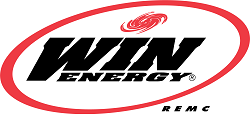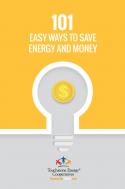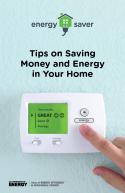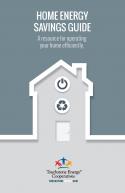What can I do to save energy?
Many people want to lower their monthly energy bill, but do not know where to start. Take a look at our tips and tricks to keep your bill low.
-
When shopping for new appliances look for the ENERGY STAR label. ENERGY STAR products are more efficient and typically exceed federal standards. View the Department of Energy's Energy Saver Appliances and Electronics for more details.
-
Only run the dishwasher when it is full and let the dishes air dry.
-
Make sure that your refrigerator/freezer temperatures are not set too low. Recommended temperatures are 37 degrees for the refrigerator and 5 degrees for the freezer. Refrigerator/freezer doors should be air tight to prevent cold air from leaking out. Proper maintenance is also important which includes vacuuming the coils and regular defrosting.
-
Wash clothes in cold water and wash and dry only full loads. Clean the lint filter on the dryer after every load. When possible air dry clothes.
-
Look for lost energy dollars in your attic or basement. A simple check of these areas may help you save real money when cold weather arrives. Remember to check any crawl spaces and the foundation of your home.
-
Vents in the attic should be left open to allow moisture to escape from the attic. Adequate ceiling insulation should be installed.
-
When the basement is used for purposes other than storage, the walls and windows should be insulated. A warm basement space provides warmer floors above. Most basements are primarily heated by the heat lost from the furnace and duct work. Heat loss from the basement is just as expensive as heat loss from an upstairs room. To reduce heat loss, install storm windows, caulk the sill joint and insulate the basement walls. If the basement is used only for storage, the duct work and the floor above should be insulated and the basement left unheated.
-
Crawl space vents should be closed during the winter unless the furnace is in the crawl space or there is a moisture problem. If vents cannot be closed, insulating panels can be inserted. Vents may remain closed during the summer if there is no moisture problem.
-
Insulated skirting should be installed in mobile homes and manufactured housing foundations to reduce air flow and raise the temperature below the structure.
-
Look for ENERGY STAR labeled electronics. ENERGY STAR computers use 30-65% less energy than computers without this designation, depending on usage.
-
For Computer energy savings consider enabling sleep mode if you aren't going to use your computer for more than 20 minutes and switch off your computer and monitor if you wont use it for more than two hours.
-
Unplug chargers when not in use. Chargers will continue to use electricity even when equipment is not plugged into it.
-
Electronics can continue to draw electricity even when they are off, which is called vampire loads. To reduce phantom loads, plug electronics such as TV, DVD players, VCR's and video games into smart power strips. Turning the switch off on the power strip when not in use can save money on the electric bill.
-
Set your thermostat as low as comfortable in the winter and as high as comfortable in the summer. It is recommended to set the thermostat at 68 degrees in the winter and 78 degrees in the summer.
- Clean or replace your furnace filters every month. This allows the furnace to run more efficiently.
-
Keep vents and registers clear of furniture and drapes.
-
During the winter keep shades open to allow the heat from the sun into your home. During the summer close shades to keep the sun's heat out.
-
In cold weather, your heating system works much harder to keep your home comfortable. Even if you don't change your thermostat setting, it runs longer to heat your home. Even gas heating systems use electricity to power the fan and distribute the warm air.
- If you are installing a new heating and cooling unit you may be eligible for a rebate. Check out our Rebate Incentive Program for details.
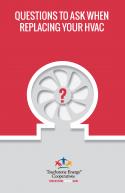
You can also review "Questions to Ask When Replacing Your HVAC" for more tips. The Department of Energy offers these winter energy savings tips: https://www.energy.gov/energysaver/fall-and-winter-energy-saving-tips.
-
Insulation is measured in R-values. The Department of Energy (DOE) recommends R-values based on the climate conditions in the area. View the recommended R-values for your area.
-
Proper insulation eliminates unnecessary transfers of heat from your home to the outside.
-
Have your home tested for air tightness.
-
Install double-pane windows.
-
Caulk and weatherstrip doors and windows.
-
Caulk air leaks around plumbing, ducting and electrical wiring entrances.
-
Install insulation around outlets and switches.
-
Seal air leaks around recess can lighting and kitchen and bathroom exhaust fans.
-
Install ENERGY STAR qualified LED or CFL bulbs. They use less electricity than an incandescent light bulb and produce less heat. The reduction in heat makes them safer to handle and in the summer the air conditioning system will not have to work to cool heat generated by the lighting.
-
Install ENERGY STAR qualified light fixtures.
-
When possible take advantage of daylight. This may allow you to keep lights off during the day.
-
Turn off unnecessary lighting.
-
Use outdoor lighting that have photocells or motion sensors.
Visit the U.S. Environmental Protection Agency website to learn about mercury in CFL bulbs and how to properly dispose of them.
Water heating accounts for approximately 12% of your homes energy consumption. Here are some steps to take to reduce your water heating bills:
-
Install an ENERGY STAR labeled water heater.
-
Lower the thermostat on the water heater to 120 degrees F.
-
Insulate the water heater with an insulation blanket.
-
Install low-flow shower heads and faucet aerators.
-
Wash laundry in cold water if possible.

